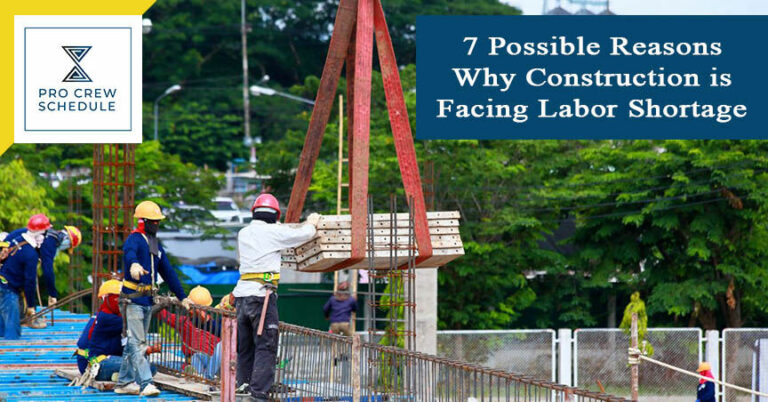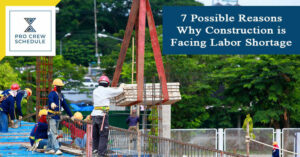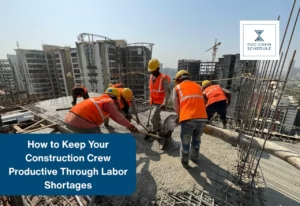One of the most pressing issues today in the construction industry is employee retention, and companies are finally taking notice. Recently, firms have realized that construction workforce management is more than just providing competitive wages, giving regular working hours, and keeping them in a technically safe environment to say they are making a steady living.
Against what most employers think, a great salary doesn’t buy an employee job fulfillment, high performance, and ownership of work. Well-crafted job offers can be attractive at first but only guarantee that a worker will stay in a company for a short time. When hiring employees for construction projects, especially big ones, companies try to implement the sink-or-swim method. This tends to weed people out, but this method seldom works out in the company’s favor. Forcing employees to prove themselves worthy of a job without providing the support they need to succeed often brings the company failure.
Managing construction projects is not easy – this can be a potential breeding ground for poor management, disorganization, high levels of stress, and collective burnout. You might be reading this article since you are currently experiencing a labor shortage in your construction team. Let’s dive into possible reasons why you are not retaining your employees and learn how to implement better construction workforce management better.
1. Misunderstanding of Designated Roles and Responsibilities
Construction teams that lack that have gray lines regarding roles and responsibility are clearly on the fast track toward failure. This unclear and undefined approach to executing project goals can create a work environment that harbors ill feelings toward the company.
How efficient a project is can be hinged on how good the construction task management is. With clarity on who is assigned to which task, the team is protected from all kinds of misinformation and overlapping of work. Details falling through the cracks typically leads to increased Non-Conformance Reports, schedule delays, and employee conflict.
Construction engineers will never understand what responsibilities fall under their scope, which eventually sets them up for failure. Given that their roles require them to juggle important and urgent issues daily, Engineers shouldn’t waste energy and time in putting pieces together for management.
Now, it’s time to take a step back, reflect on, and establish clear and defined job scope for each team member. When a new phase of your project comes up, delegate the task accordingly to an assigned individual, not the entire group. Letting go of the expectation that someone will always “pick it up” will amazingly serve your team.
2. Constantly Micromanaging Employees is Toxic
Boosting employee retention to engage high performance between teams requires top-notch management skills. Construction professionals with top management skills are known for their trust in their team members and never resort to micromanaging.
Time and time again, in all industries, we see managers and supervisors who have been promoted into managerial positions without the necessary training to lead and manage people effectively. Without having these leadership skills, many professionals resort to micromanaging.
In construction, micromanaging is one of the top causes of employee disengagement and, worse, resignation. Managers should be trusting of how their engineers perform their tasks. Once the task and timeline are communicated, the manager need not try to be controlling of who, what, when, and how anymore.
You can input in construction management software, like Pro Crew Schedule, what needs to be done, who will do it, and when it’s needed to be completed. Micromanaging will not cross your mind anymore when a construction crew scheduling feature is already available to you – just input the job details and let your employees flesh it out on their own.
Give them the autonomy to get to the results using their game plan and creativity to execute the job. It will boost employee engagement and trust to a whole new level.
3. Accountability is Embodied in the Workplace
How we hold our team members accountable makes all the difference in the construction world, especially to high-performing individuals. If there are members on the team who miss deadlines, aren’t delivering, or falling short on their work responsibilities, it needs to be addressed as early as possible.
When a worker fails to meet the expectations of their role and a manager refuses to confront the employee, other team members are forced to step in and help complete their tasks. This type of environment creates unnecessary and additional work for the surrounding team that can be entirely avoidable.
Doing your assigned tasks can be tiring, but picking up other people’s workload can be too much just because a manager needs to practice accountability. Failing to hold your team accountable for their actions disservice the employees who have to step up and do their work and also promotes poor management for the company.
4. Employees Don’t See Career Growth in the Company
If you want to keep your employees for a long time, you must cultivate a construction company where they can learn, hone their technical skill sets, and progress in their field of choice. Nowadays, employees are not satisfied with only a job title, and they want a career and opportunity for growth. They want to get better at their job to work better for you.
In order to do this, a company needs to establish a training system between workers that encourages and motivates employees to advance in their careers. You will increase productivity, retain employees, and implement better construction management for years by providing them with training and learning opportunities.
The more skills your employees acquire, the more confident they will become in their jobs. They’ll feel more productive once they start applying what they learned in training in their actual work. You can even establish a career advancement structure to help them progress even higher in their field. This will not only give them the encouragement they need but also make them want to stick around in your company for longer.
5. No Health Benefits and Safety Standards in Place
We all know that construction industry jobs include more physical labor than any industry, and with that comes more risk for injuries and accidents than other professions. Yes, employees can get injured at a desk job, and workers can slip and fall on a newly mopped floor, but these risks pale compared to getting hit by moving machinery or falling off a building roof.
This is why providing construction employees with top-notch healthcare benefits can be key to employee retention. Skilled talents sometimes leave their companies due to poor health benefits, even if the salary package is better than average. Feeling safe in a company you work for is invaluable, especially in this day and age.
Make your employees know that the company supports them if they get hurt or sick while working. This could be the difference between a good employee staying within the company or leaving to find a job elsewhere.
6. Poor Management and Miscommunication
Managers in construction usually climb up the corporate ranks because of their tenure in the company. These construction managers get promoted based on years of experience they’ve acquired in the industry. However, length of experience only sometimes translates to strong management and leadership skills. On big projects, the stakes are too high to hire managers that need more management ability.
Working for a construction manager who needs help encouraging and keeping the team together demotivates many employees from staying with the company. Eventually, they lose respect for the manager and feel unsupported and lost. They feel like they need to be properly led.
7. Not Embracing Technological Advancement
Due to the diminishing skill and labor shortage in the construction industry, companies have begun to explore more technological advancement to improve efficiency and better meet customer expectations. Drones are one of the leading examples of technology your company should be familiar with. Global positioning satellite (GPS) technology, Virtual Reality (VR), Building Information Modeling (BIM), and Construction Management Software integrated with construction time tracking features are some of the innovations in construction that you should explore.
Innovative tools and digital solutions not only help in retaining old employees but also help in recruiting the younger generation to join the workforce.
Conclusion
The construction industry has established itself as a lucrative field where big companies have worked for generation after generation to build their names. Companies that withstood the test of time despite the issues and have mastered the art of developing efficient processes and inclusive company culture will thrive.
However, there is always room for improvement, especially with how the world is going today. We are now where remote work is a norm for many industries. Communication, technology, and processes must constantly be updated to re-boost employee morale and engagement on these construction projects. If not, massive turnover will persist in taking away from product and profit.







